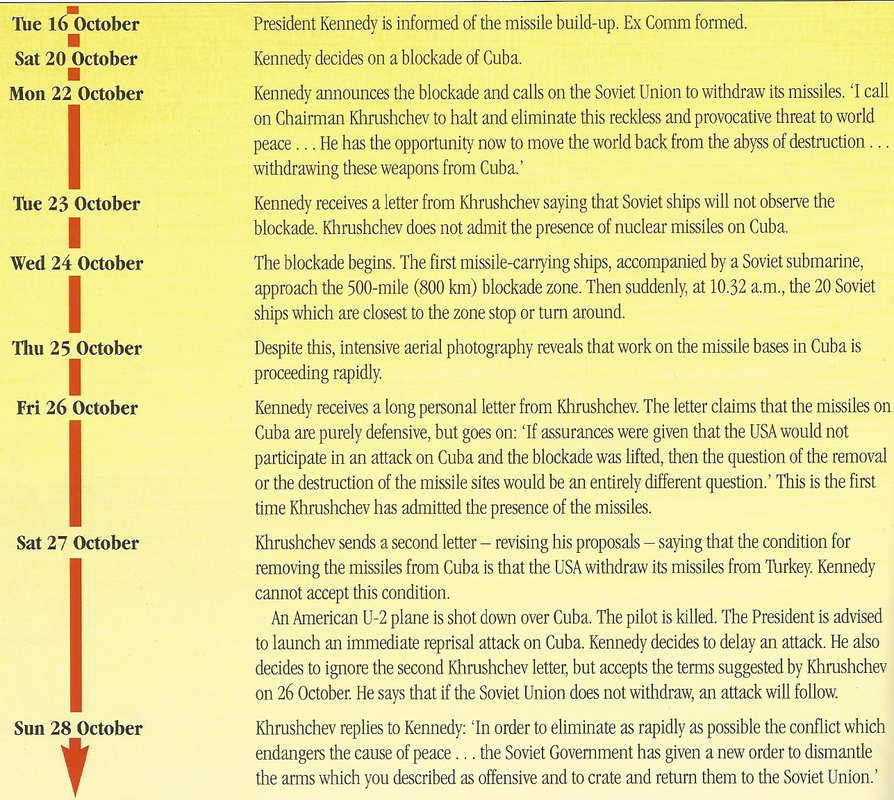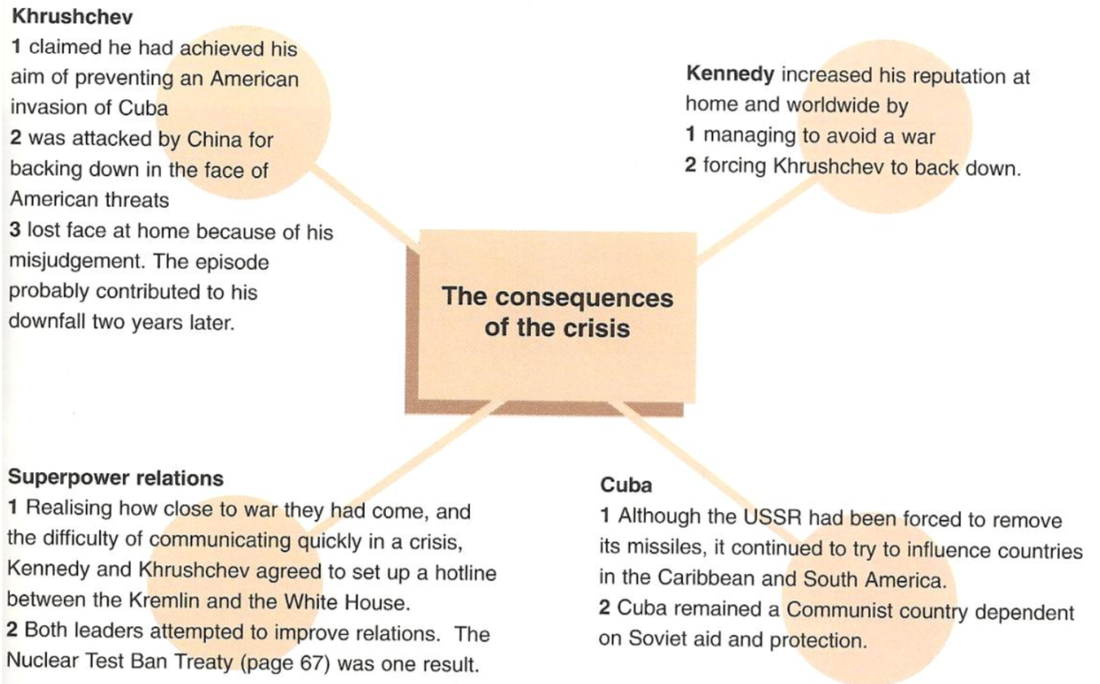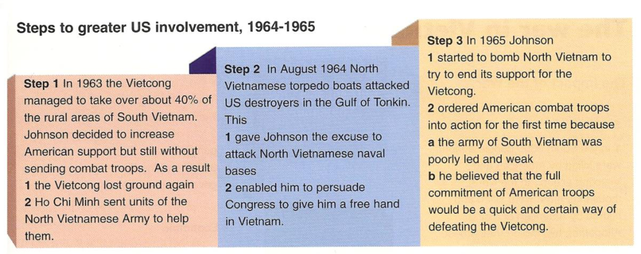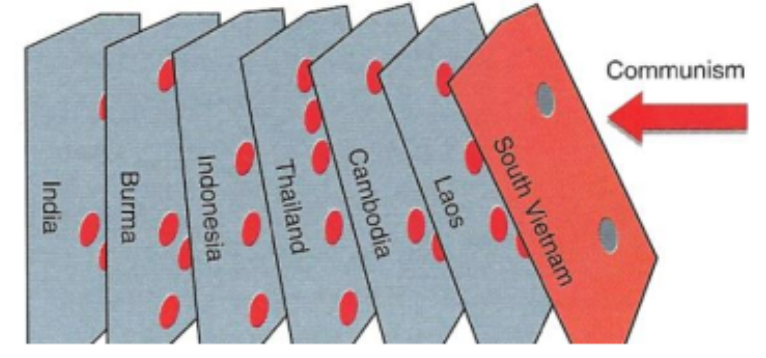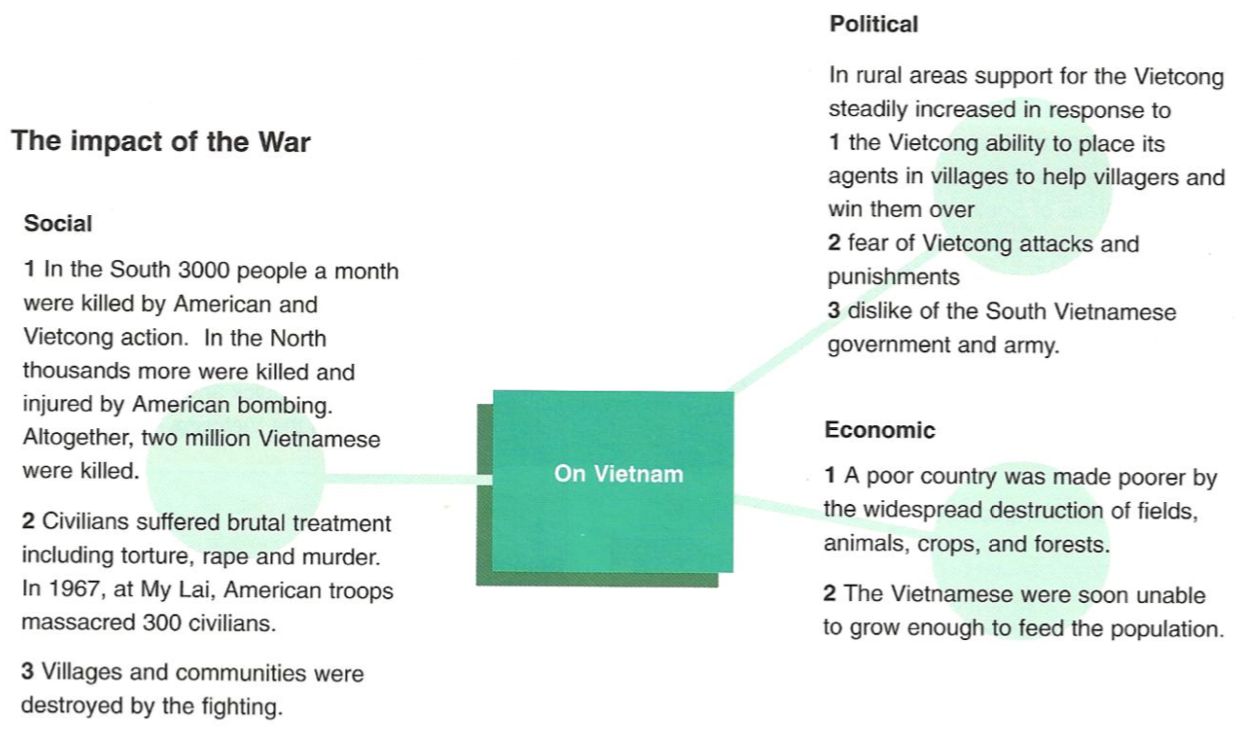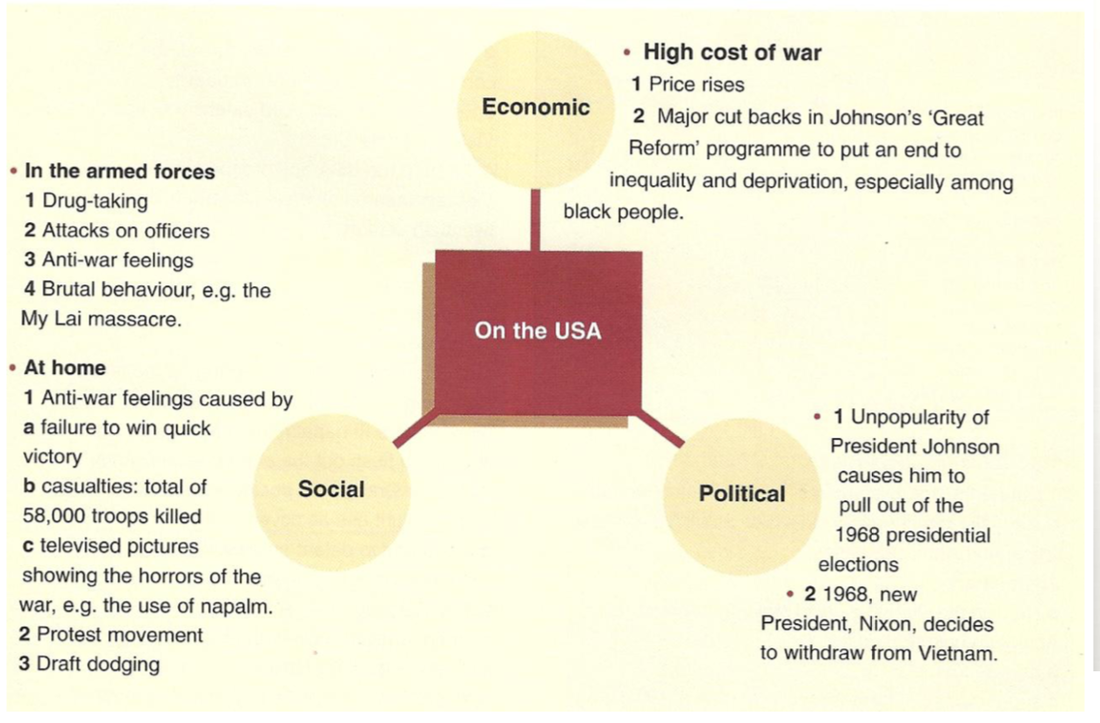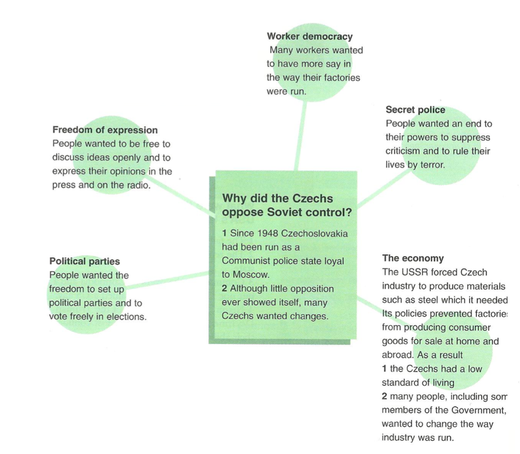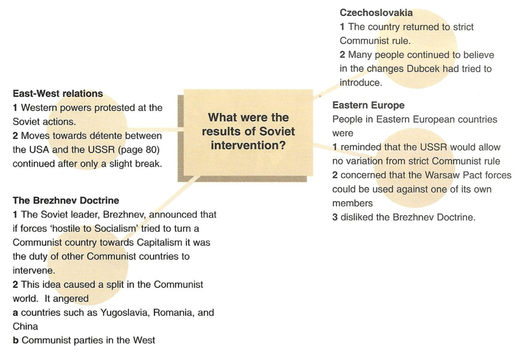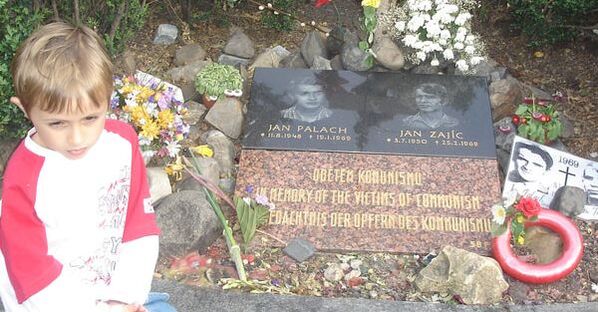Lesson 5 - 1960s
In 1961 a second Berlin crisis resulted in the building of the iconic symbol of the Cold War, the Berlin Wall. A year later, partly as a result of the Berlin crisis, the world came close to nuclear war on the island of Cuba. Both of these events were consequences of Cold War events we have already studied. The 'problem' of Berlin had been left unresolved after the blockade and airlift of 1948-9. The Paris talks designed to address the problem had collapsed in the aftermath of the U2 spy plane incident a year before in May 1960. The Cuban revolution led by Fidel Castro in 1959 was a culmination of a fierce five and a half year struggle to establish an independent Cuban state which overthrew the military dictatorship of Fulgencio Batista. Like many states in central America, Cuba had traditionally been a client state of the USA, its leaders no more than puppets placed to uphold US strategic and economic interest.
|
|
Berlin Crisis - Walsh 407-409. Begin with this film and then get the key information from the presentation.
|
|
|
Activity 1
Using the presentation, the films and your textbook, explain a) Why the wall was built and how it worked. b) What the consequences were for the Cold War. |
We examine the Cuban missile crisis in two stages. Firstly we examine the causes, why Castro and Khrushchev decided to put the missiles on the island and why this presented a problem to the USA. (Walsh 346-52)
|
|
|
Activity 2
This activity asks you to imagine that you were part of President Kennedy's group of advisors, the so-called 'Ex comm' committee. You are going to advise the President about how to respond. You can download the worksheet here.
You should begin by reviewing the presentation above and watching the short film - Cuban Crisis Ex comm - from the Cold War series. It is important that you consider the options available to you empathetically, as if you were present in October 1962 and not with advantage of hindsight.
This activity asks you to imagine that you were part of President Kennedy's group of advisors, the so-called 'Ex comm' committee. You are going to advise the President about how to respond. You can download the worksheet here.
You should begin by reviewing the presentation above and watching the short film - Cuban Crisis Ex comm - from the Cold War series. It is important that you consider the options available to you empathetically, as if you were present in October 1962 and not with advantage of hindsight.
|
Activity 3
a) Using the film and the information above, explain how Kennedy was able to resolve the crisis. b) Using your textbook page 352, outline the main consequences of the Cuban crisis for for the development of the Cold War. 2022 - 60 years since the crisis new documents reveal how close the world was to nuclear war - Guardian. |
|
The shock of Cuban missile crisis had shaken the superpowers into a period of relaxation of tensions that would later be called 'detente'. But from 1964 the USA became gradually entangled in a continuation of Vietnam's war for independence, (See decolonisation) whilst the USSR faced a reemergence of the desire for greater independence in its satellite states last seen in Poland and Hungary in 1956.
Vietnam (Walsh 353-65)
We have already seen how in the late 1940s and early 1950s the USA gradually became committed to the support of France in Indochina in order to stop the spread of communism. This became known and the domino theory. The involvement of the USA in Vietnam can be shown in a series of steps, each of which increased the level of the USA's commitment.
We have already seen how in the late 1940s and early 1950s the USA gradually became committed to the support of France in Indochina in order to stop the spread of communism. This became known and the domino theory. The involvement of the USA in Vietnam can be shown in a series of steps, each of which increased the level of the USA's commitment.
|
Activity 4
You have already seen the film above in 11e - Vietnam: Camera at War - it is my favourite documentary. |
|
Why do you think the US army blamed the media for the defeat in Vietnam? What other reasons help explain the cause of US defeat? In 11e we looked at the changing nature of warfare and how Vietnam is considered to be an early example of fourth generational warfare or assymetrical war. You might like to remind yourself of some of the points we made (exactly two years ago) here. The current war in Gaza (2023) is the latest example of fourth generational war. In contrast, the war in Ukraine (2022-) is not, so what is it?
Activity 5
Draw up a table to compare the impact of the Vietnam War on Vietnam and the USA. (Walsh 365 is also useful) This is also important for our topic 'decolonisation and the Third World'. The table covers political, economic and social consequences but not cultural. Can you suggest what some of the cultural consequences of the war in Vietnam might be?
Asia Pacific Curriclum - Impact of the war on Vietnam.
L.A. Times on the cultural impact of Vietnam on the USA.
Draw up a table to compare the impact of the Vietnam War on Vietnam and the USA. (Walsh 365 is also useful) This is also important for our topic 'decolonisation and the Third World'. The table covers political, economic and social consequences but not cultural. Can you suggest what some of the cultural consequences of the war in Vietnam might be?
Asia Pacific Curriclum - Impact of the war on Vietnam.
L.A. Times on the cultural impact of Vietnam on the USA.
|
|
|
Czechoslovakia 1968 (Walsh 404-6)
|
As we saw earlier, in the post war period Czechoslovakia became a satellite state of the Soviet Union; it was a founding member of the Council for Mutual Economic Assistance (Comecon) in 1949 and of the Warsaw Pact in 1955.
In the early 1960s, the Czechoslovak economy became severely stagnated. The industrial growth rate was the lowest in Eastern Europe. As a result, in 1965 the party approved the New Economic Model, introducing free market elements into the economy. On January 5, 1968, the Communist Party elected Alexander Dubček a Slovak reformer as first secretary of the KSČ (Slovak Communist Party). In April, Dubček launched an "Action Programme" of liberalisations that included increased freedom of the press, emphasis on consumer goods, and the possibility of a more democratic multi-party government. This became known as the Prague Spring. |
The new Soviet leader Leonid Brezhnev - who had replaced Khrushchev who had been deposed in 1964 - at first tried to limit the changes through negotiations and diplomatic pressure. Then after a final failed attempt to force change through the Bratislava Declaration in August 1968, on the night of August 20 - August 21, 1968, Eastern Bloc armies from five Warsaw Pact countries invaded Czechoslovakia.
The justification of this invasion would later become known as the Brezhnev Doctrine, a Soviet foreign policy that proclaimed any threat to socialist rule in any state of the Soviet bloc in Central and Eastern Europe was a threat to them all, and therefore justified the intervention of fellow socialist states.
The justification of this invasion would later become known as the Brezhnev Doctrine, a Soviet foreign policy that proclaimed any threat to socialist rule in any state of the Soviet bloc in Central and Eastern Europe was a threat to them all, and therefore justified the intervention of fellow socialist states.
During the Warsaw Pact invasion, Soviet tanks ranging in numbers from 5,000 to 7,000 occupied the streets. They were followed by a large number of Warsaw Pact troops ranging from 200,000 to 600,000. During the attack of the Warsaw Pact armies, 72 Czechs and Slovaks were killed (19 of those in Slovakia) and hundreds were wounded (up to September 3, 1968). Unlike in Hungary in 1956, Alexander Dubček called upon his people not to resist. He was arrested and taken to Moscow, along with several of his colleagues.
|
Finally, in April 1969, Dubček was replaced as First Secretary by Gustáv Husák.
As with the Americans in Vietnam, the Prague Spring was a blow to the confidence of the USSR. As a result, both superpowers sought to improve their relations, the consequence was detente. |
Consequences
The invasion was followed by a wave of emigration, 300,000 typically highly qualified people were to leave Czechoslovakia. It was agreed that Dubček would remain in office and that a program of moderate reform would continue. On January 19, 1969, student Jan Palach set himself on fire in Prague's Wenceslas Square to protest the renewed suppression of free speech. |
Activity 6
|
|
Watch the Cold War episode on the Prague Spring.
a) Explain why there was support for economic and political reform in Czechoslovakia and why this presented problems for the USSR. b) What were the consequences of the Prague Spring for both Czechoslovakia and the Cold War. |

